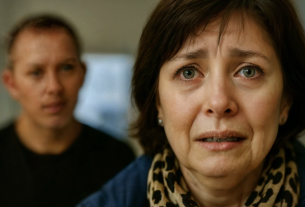— “And what’s this?”
Igor carelessly tossed a crumpled scrap of paper onto the kitchen table in front of Sveta. A receipt from a cosmetics store. He held it between two fingers as if it were too filthy to touch—a piece of damning evidence proving a monstrous crime. His voice was calm, even tired, which infuriated far more than any shouting could have. It was the tone of an investigator listening for the hundredth time to the clumsy lies of an obviously guilty suspect.
— “It’s lipstick,” Sveta replied, not lifting her eyes from the cup of cooling tea in her hands. She didn’t even glance at the receipt. She knew it by heart: 540 rubles. The crime of the century.
— “I’m not asking what it is. I’m asking why?” He leaned on the table, looming over her. “You already have a whole bag full of lipsticks. We have a mortgage. We have expenses for the kids. And you’re still buying useless junk. Every week it’s some new trinket. You just can’t control yourself.”
He spoke slowly, hammering each word in like a nail. He relished his role as the thrifty head of the household, the noble guardian forced to fight against the mindless female urge to waste money. He didn’t notice—or didn’t want to notice—his new phone that cost sixty thousand, bought just last week because the “old one was lagging.” He’d forgotten about the three thousand rubles spent at the bar with his friends last Friday because “sometimes you need to relax.” Those were necessary, justified expenses. But her lipstick for 540 rubles? That was a gaping hole in their family ship, one he, the valiant captain, was forced to patch.
Sveta slowly raised her eyes to him. There was no offense there, no anger. Only cold, polished steel. That look made him falter for a split second. He had expected excuses, arguments—anything but this dead emptiness.
— “You think I’m a spendthrift? Fine. Starting today, we have separate budgets. We’ll see who runs out of money first.”
Without waiting for his reply, she stood up, grabbed her purse and car keys from the chair. Igor stared after her, stunned, his mouth half-open for some sarcastic remark that never came. She simply left. He smirked, shook his head, and sat down in her place. Another scene. An hour later she’d be back, and everything would go back to normal.
But she came back twenty minutes later. Silently she walked into the kitchen and dumped a fat, tight wad of cash on the table. Fresh, crisp bills, still smelling of the ATM. Igor stared at the pile, bewildered. Sveta pulled a few plain envelopes and a black marker out of the drawer.
The ritual began. He watched her like an actress in some avant-garde play. She acted with icy, almost surgical precision. Counted out the necessary sum into the first envelope. The harsh squeak of the marker: “UTILITIES.” Counted more into the second: “GROCERIES.” Third: “KIDS (school, activities).” Her movements were quick, practiced; her fingers flew as she sorted the bills. You could see she’d long carried all these numbers in her head—she didn’t hesitate for a second. This was her silent, invisible labor, now finally brought into the light.
When all the essential expenses were distributed, a sizable stack of bills remained—their combined salaries minus life. Sveta, without blinking, split it exactly in half. She didn’t look at him. She looked only at the money, as if it were the only living participant in this scene. At last, she pushed one half of the stack toward him.
— “Here. This is your personal money for the month,” she said in that same metallic voice. “Gas, lunches, beer with friends, your gadgets, your ‘relaxation’—all from here.”
Then she gathered her half and placed it into the last, blank envelope.
— “This is mine. Cosmetics, coffee with a friend, tights, my ‘trinkets’—all from here. The joint budget no longer exists. We have two private ones now. See you at the finish line, darling. Or at the ATM, when one of us runs out first.”
She stood and went to the bedroom, leaving him alone at the table. Igor looked at his stack of money. He reached out and touched it. A condescending smile played on his lips. What a performance. What an absurdity. He was sure this “game” would end in a week, when she couldn’t afford some household necessity. He didn’t yet realize the race had already started—and he had given himself a huge handicap… against himself.
The first few days Igor treated it like a dragged-out, badly acted joke. With exaggerated ease, he pulled cash from his envelope for lunches at the pricey café near his office, ostentatiously leaving big tips. Coming home in the evenings, he would casually toss a receipt on the kitchen table, his whole demeanor saying: look, I can afford this, your game doesn’t faze me. He waited for her to break. For her pathetic envelope to empty out after detergent or unplanned kids’ tights, forcing her to come begging.
Sveta seemed oblivious to his displays. She entered her new mode with the unemotional efficiency of a cleaning robot. A thermos appeared on the kitchen counter, which she silently filled with home-brewed coffee. Next to the kids’ lunch boxes stood her own. She stopped going to cafés, steered clear of stores; her spending shrank to an absolutely precise minimum. Igor watched this with a contemptuous smirk. At work he joked with a colleague that his wife was doing a “financial detox,” and they both laughed. To him, this was still her whim, her problem.
The first warning bell rang the next Tuesday. They were driving to the mall to pick up their son from practice when the low-fuel light lit up insistently on the dash. Igor, eyes on the road, said as usual:
— “Sveta, throw in some money for gas, we won’t make it.”
— “You have your own envelope. Gas is your expense this week, you’ve been driving for your errands the last three days.”
He blinked, even turned his head toward her. He expected a complaint, an argument—anything but that calm statement of fact.
— “Oh, come on, don’t start. It’s our car, we’re going to get our son.”
— “The car is shared. The gas in it isn’t. I drove my share over the weekend taking the kids to my mom.”
She didn’t look at him. She gazed out the window, her profile as hard and flawless as on an ancient coin. Igor had to pull into the gas station and, with an unfamiliar, nasty feeling, count out bills from his already thinning envelope. The crinkle of those notes in the cashier’s hands sounded like mockery. It was his money. Not some abstract digits in a joint account, but his own, tangible cash he could’ve spent on a steak or a new game.
The real blow came Friday. Their younger daughter brought home a notice from school—two thousand rubles needed for a field trip to the planetarium. Igor came home from work, saw the paper on the table, and casually waved it off:
— “Pay it if you need to.”
Sveta, at that moment unloading the cheapest groceries from a distant discount hypermarket she drove to specially for savings, didn’t even turn around.
— “The ‘Kids’ envelope is on the table. Put in your thousand. I already put mine.”
Igor froze. This wasn’t about gas anymore. This was real. He approached and saw the half-open envelope, with a single thousand-ruble bill—Sveta’s—inside. He had to take his envelope, open it, pull out his thousand, and add it. That simple physical act suddenly felt humiliating. He had to give up his money. Not for beer, not for fun, but for something that had always been just a vague budget line somewhere out there. He yanked a bill from his stack and almost threw it into the kids’ envelope.
— “Happy now?” he hissed through his teeth.
Sveta finally turned. She looked at him long and hard, then at the envelope, then back at him.
— “This is only the beginning,” she said quietly. “The race goes on.”
Igor said nothing. He silently left the room, feeling a dull, helpless rage boiling inside. His smug smile had vanished for good. This wasn’t a game anymore. It was war. And he was beginning to realize he was losing it on his own turf.
By the third week of the experiment, the air in the apartment had thickened. It felt viscous, like tar, and every breath took effort. Igor’s condescending smirk was long gone, replaced by the look of a trapped animal. His once-plump envelope had shriveled to a thin, pathetic shell with a few crumpled notes rattling inside. The realization that he was losing at a game he himself had provoked didn’t just anger him—it burned him from within, reducing his pride to ashes. He, the clever, calculating, successful one, was being beaten by simple female stubbornness. So he shifted from passive defense to active offense. His tactic: scorched earth.
The first strike hit her tiny personal joys. Sveta, having scrimped on lunches, treated herself to a small piece of expensive blue-cheese and a jar of olives—her little holiday amid total austerity. She looked forward to the evening when, after putting the kids to bed, she’d sit with a book and savor the taste. Coming home from a walk with their daughter, she found the empty cheese wrapper and the jar with a few drops of brine on the table. Igor sat in the living room watching football.
— “Did you see my cheese?” she asked from the doorway. Her voice was even, but a taut string vibrated in it.
— “Oh, that stinky thing? Ate it with beer,” he didn’t even turn his head. “What, was it special or something? It was in the common fridge. Or do we have our shelves labeled now?”
Bullseye. He knew she wouldn’t stoop to dividing the fridge. He used their shared territory as a weapon. Sveta said nothing. She silently cleaned up the wrapper and jar, but inside something froze into an icy lump. This wasn’t just eaten food. It was a deliberate, conscious incursion. He was destroying the little she allowed herself with her saved money to prove her private space didn’t exist.
The main strike came a few days later. Their son was doing homework on his tablet at the kitchen table. Igor passed by with a cup of coffee. His movement was overly clumsy, too theatrical. He tripped on the chair leg, flailed his arms, and the hot coffee splashed right onto the tablet screen. A short hiss, a spark, and the screen went black forever. Their son cried out in fright.
— “Damn, what a klutz!” Igor exclaimed, putting the empty cup on the table. His voice held just enough regret to sound believable, but his eyes, meeting Sveta’s for a split second, gleamed with gloating triumph.
— “Dad, you broke my tablet!” the boy’s voice quivered with tears.
— “It’s okay, son, we’ll fix it,” Igor soothed and turned to Sveta. “Well, that’s a mishap. Let’s chip in for repairs from the kids’ envelope. There should be money there.”
Here it was—his plan in all its ugly glory. The kids’ envelope was for planned expenses. Repairing an expensive gadget would punch a huge hole in it, maybe empty it altogether. He knew Sveta wouldn’t leave her son without a tablet needed for school. He was cornering her, forcing her to spend the strictly limited shared money to cover the consequences of his “clumsiness.”
Sveta was silent for a long time, staring at the blackened screen. She saw it all: his fake remorse, his real aim. She could have screamed, accused him, but what was the point? He’d just say, “What, you think I did it on purpose?” and she’d look like a hysteric. She picked up the dead tablet, turned it over, and set it back down.
— “Don’t bother. I’ll handle it.”
That evening she came back with a new tablet. Not as fancy as the old one, but functional. She silently handed it to their son. Igor, watching from the living room, couldn’t resist.
— “Where’d the money come from? Took it from the kids’ envelope on the sly?”
Sveta slowly turned toward him. Her face was a mask. She went to the dresser, pulled out her personal envelope, and dumped it on the table. It was empty. Absolutely.
— “I spent mine,” she said crisply. “All of it. Every last kopeck. Hope you’re happy with your coffee.”
Her voice no longer held metal. It held ice. Absolute zero, where all life freezes. She hadn’t given up; she’d accepted his rules and made her move in this cruel game. She’d sacrificed her financial independence to show him he wouldn’t break her. Her resolve, tempered by his petty and major sabotage, had transformed into something else. Not resentment. Not anger. Cold, calculating hatred. And now she waited. Waited for his scrawny envelope to finally give up the ghost so she could deliver the crushing counterstrike.
A week before payday, Igor’s money was gone. Not just low—gone, vanished, leaving behind bitter bewilderment and an empty, humiliatingly light envelope. He’d spent the last few days under the strictest austerity, but his ingrained habits were stronger. Lunch in the cafeteria instead of the café still cost money. Gas at the bare minimum still had to be paid. His world, built on easy, invisible spending from the shared pot, collapsed, leaving him a pauper in his own home.
The silence in the apartment became a weapon. They moved across the same space like two warring spies, tracking each other’s every step but avoiding direct contact. Sveta embodied icy calm. She’d won. Her envelope was also empty, but she’d done it deliberately, turning her financial capitulation into a moral victory. She’d shown she could endure any blow of his. Now she simply waited. And her waiting was scarier than any fight.
The climax came Thursday evening. Igor’s phone vibrated in his pocket. He saw his sister’s name and stepped out onto the balcony. The call was brief. He returned with a gray, haggard face. He stood in the kitchen for a long time, staring into space. Sveta was washing dishes, her back straight and tense. She felt his gaze but didn’t turn. At last, he couldn’t take it.
— “I need to go to my mother’s urgently. She fell, something’s wrong with her leg.”
He said it as if announcing an indisputable fact. He wasn’t asking. He was stating, expecting the ancient instinct of family solidarity to trigger automatically. Sveta slowly turned off the faucet. Wiped her hands on a towel. Only then turned to him.
— “And?”
That short, indifferent word hit him like a slap. He’d expected questions, sympathy—anything but this.
— “What do you mean ‘and’? I need money for the ticket. And some to take with me. I have to be there tomorrow.”
He stared at her, trying to pin her down with his gaze, with his masculine righteousness, the sanctity of filial duty. But her eyes were like two cloudy pieces of glass. Nothing reflected there.
— “Your envelope is empty,” she stated. “Mine too.”
— “I’m not talking about personal money!” his voice cracked slightly. “There’s the common funds! Take from there! This is an emergency, our family!”
Sveta silently walked to the dresser where the three sacred envelopes lay. Her movements were slow, ritualistic. She took the first, labeled “Utilities.” Turned it over in her hands.
— “This is for the apartment and internet. A train ticket to your mom’s isn’t a utility.”
She set it back, took the next one—“Groceries.”
— “This is for food for us and the kids until month-end. Your trip isn’t food.”
She set it aside and took the last—“Kids.”
— “This is for school and activities. Your mother, with all due respect, isn’t our child. Her health doesn’t fall under this budget item.”
She neatly stacked the envelopes and looked at him. And at that moment Igor understood. He hadn’t lost money. He’d lost everything.
— “You… you’re serious?” he croaked. “My mother… and you… you’re counting envelopes?”
Then Sveta spoke. Her voice was quiet, even, without the slightest hint of emotion, which made it all the more terrifying.
— “Yes. I count money. Just like you counted every kopeck on that lipstick receipt. Your mother is your personal expense. Just like your beer with friends, your lunches out, and your new phone case. You spent your ticket to her two weeks ago, only you spread it across bar tabs. You ate her medicine money in that steak you photographed to show me how good life is. You burned your son’s duty together with the gas you wasted driving aimlessly. And then you smashed it against the tablet screen, just to prove to me you’re the boss.”
She took a step toward him. Her eyes no longer held emptiness. In them burned a cold, white fire of absolute hatred.
— “You don’t have money not because I won’t give it to you. You don’t have it because you spent it. On yourself. Like always. You burned every bridge yourself. And now you’re shocked you can’t cross to the other side. Walk on foot.”
She turned and walked to the bedroom. Didn’t slam the door. Just left. And Igor stood in the middle of the kitchen. He looked at the three neat envelopes on the dresser. They weren’t just paper with cash. They were three tombstones on the grave of their marriage. And only now did he realize he was buried alive beneath them.



